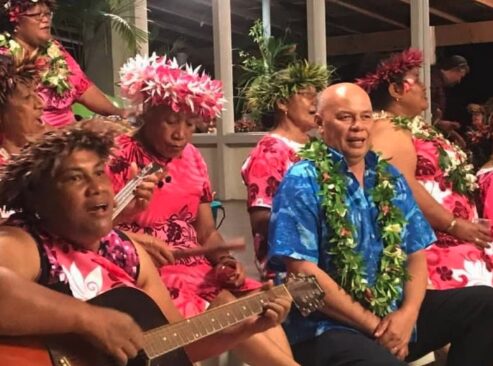The 2024 theme for Niue Language Week is ‘Leveki mo e Feaki e Vagahau Niue ma Anoiha – Protect and Nurture Vagahau Niue for the Future.’.
As well as celebrations to mark Faahi Tapu he Vagahau Niue, Niue Language Week, the country has also been celebrating Pule Fakamotu, 50 years of self-government, throughout the year. The historic occasion has seen events held both in Aotearoa New Zealand and Niue.
The first Niue Research Symposium was launched at the University of Auckland on 5 October, organised by Te Poutoko Ora a Kiwa, Centre for Pacific and Global Health.
Co-director of Te Poutoko Ora a Kiwa, Associate Dean of Pacific Faculty of Medicine and Health Sciences, and Associate Professor of Population Health Sir Collin Tukuitonga, says he was fortunate to have Niuean as his first language, like many Niueans of his generation.
“Vagahau Niue is in dire straits. I’m involved with a number of people doing our best to save it. But the language is losing ground every year.”
Niuean is listed by UNESCO as one of the languages at risk of extinction. Niue has a population of around 1,564 but many of its diaspora in Aotearoa, some 30,000 don’t speak Niuean.
“I’m lucky that, for me, and for others in my generation, Niuean was our first language, although we learned English at school.”
Sir Collin said much work was being done behind the scenes to lobby the various ministries to work with the communities and churches around language revitalisation.

The Happiness Project
PhD candidate Zoe Henry (Makefu/Niue, Ngāti Kahu, Ngāpuhi) is nearing the finish line to complete her doctoral thesis in Pacific Studies. A Fulbright scholar, last year she took part in The Happiness Project run by University of Otago academic researcher Dr Jess Pasisi.
Henry visited Niue for the first time with her father Salemona Patumaka. The project takes young tagata Niueans from Aotearoa back to Niue. It looks at how they interact and share knowledge, how the experience influences their understanding and ideas about Niue happiness, as well as building an understanding of mental health and well-being for Niue diaspora living abroad.
“It was my first time in Niue and also my first trip overseas with my father, so that was something special,” says Henry.
She says visiting her father’s village of Makefu was an incredible experience, especially after having spent most of last year in airports as a Fulbright exchange scholar with UCLA. It was also special to see her father shine as a knowledge-holder.
“He was wondering what he could offer being surrounded by all these smart people. It turned out he had so much knowledge to share.”
She visited the home where her father had grown up and welcomed the opportunity to explore her ties to Niue.
“Being Māori here [in Aotearoa], it was the first time being in Niue I was knocking on the ground, this ground needs to knock back, and it did.”
Henry later returned to Niue without her father and says it helped her to reconnect more deeply.

“It was good, I’m quite shy until I’m comfortable, and it forced me to step out on my own. During the first trip I met my family, and the next time it was like, ‘this is your home, you know how to act’!”
Doctoral candidate Zoe HenryWaipapa Taumata Rau, University of Auckland
Archive of traditional Niue music to be launched
The University of Auckland will launch the Richard Moyle Survey of traditional music of Niue. The audio and visual recordings were made during the Constitution celebrations of the 10th anniversary of self-government, 40 years ago.
Former University of Auckland professor Richard Moyle, an ethnomusicologist, recorded the celebrations in both Niue and Aotearoa in 1984. Huni Mancini, Archivist of Cultural Collections at the University, says making the collection available to the public was a great way to highlight both Vagahau Niue (Niue Language Week) and it was also important to recognise the 50th celebration of Pule Fakamotu, 50 years of self-government.
“We hope the collection will benefit the Niuean community both locally and globally, and contribute towards the revitalisation of Vagahau Niue.”
The archive will be made available from January 2025.
Did you know?
- Niue is the largest raised coral atoll affectionately known as ‘the rock’. As a consequence, there are no beaches in Niue;
- There are also no traffic lights or public transport on Niue ;
- Niue has a home population of just over 1,600. Diaspora in Aotearoa numbers more than 30,000 and almost 5,000 in Australia;
- Aotearoa New Zealand and Niue are on opposite sides of the International Date Line. The Tuesday morning flight from Auckland arrives in Niue on Monday afternoon despite being a three-hour flight.



